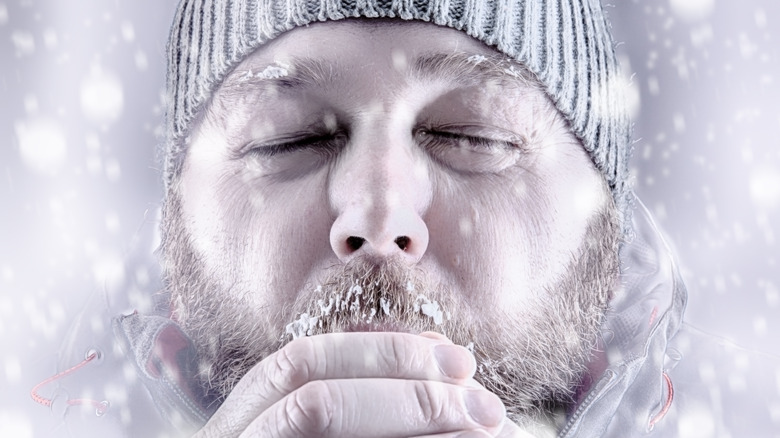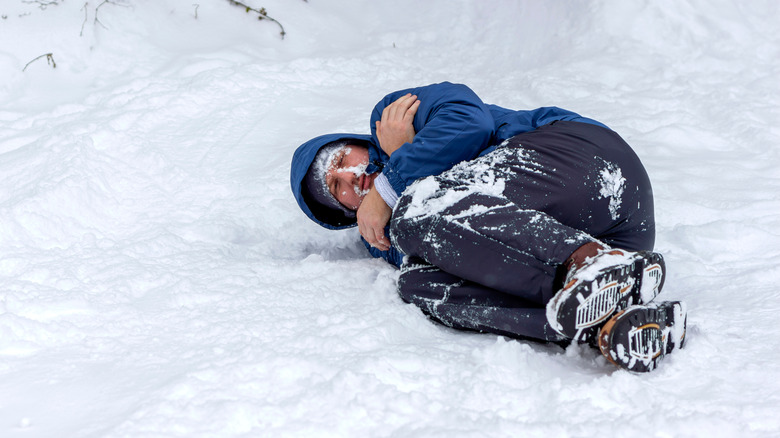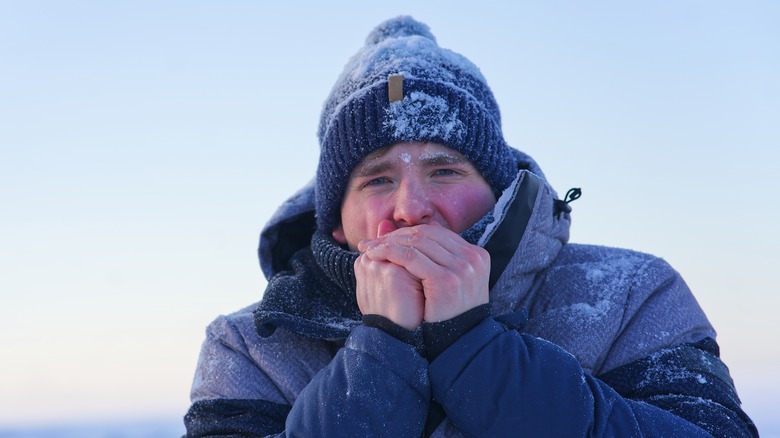What Really Happens To Your Body When You Freeze To Death
According to Live Science, a person's core body temperature is usually around 98.6 degrees Fahrenheit. The risk of death happens when temperatures outside drop between minus 40 and minus 50 degrees Fahrenheit (via the New York Post). The body, however, doesn't actually have to be frozen for death to occur. But first, hypothermia must set in.
By definition, hypothermia is when the core body temperature falls below 95 degrees. Per Outside Magazine, there isn't an exact core temperature at which the human body dies. Simply put, it can't be predicted how quickly or in whom hypothermia will strike. What is known is that as soon as the face gets hit with extreme cold, the blood moves away from the hands and towards the body's core to keep vital organs warm. Likewise, the body begins to violently shiver to generate heat once the core temperature reaches 95 degrees, and both the heart and respiratory rate accelerate. Once the core temperature begins to steadily drop below this, the real trouble begins.
Freezing to death is a process
A dramatic drop in the human body's core temperature of 98.6 degrees Fahrenheit prevents the heart and brain from working properly (via Live Science). According to Outside Magazine, every one-degree drop below 95 degrees leads to mental confusion and amnesia. It also becomes harder to move as the muscles get cold pretty quickly due to the lack of body fat in humans (per Ranker).
By the time the body reaches 88 degrees, it will likely no longer be shivering for warmth, but the kidneys are working overtime due to the increased blood flow to the organs. Kidney failure can occur, but not before the urge to urinate and the eventual loss of bladder control. At 86 degrees, the heart is no longer pumping the normal amount of blood throughout the body. The brain is starting to become even more confused, and the lack of oxygen will trigger both visual and auditory hallucinations.
As the body gets colder, it may start feeling hotter
Then, something strange happens at 85 degrees — the body feels uncontrollably hot, and victims of hypothermia begin to take off their clothes. This weird phenomenon is known as paradoxical undressing. As noted by Outside Magazine, scientists believe that the dilation of constricted blood vessels against the skin causes the body to feel extremely hot. In many cases, this is the beginning of the end. By 82 degrees, loss of consciousness occurs, and anything below 70 degrees means death is imminent as all organs start to fail and shut down.
Per the National Library of Medicine, even if a person receives medical treatment in extreme hypothermia, rewarming shock can occur. This is when a sudden drop in blood pressure can cause cardiac arrest and death. The lesson here is to bundle up and stay indoors when temperatures reach all-time lows. According to the New York Post, children and the elderly are at the most at risk for hypothermia due to their weak heart muscles.
Is it painful to freeze to death?
Depending on the situation, eMedicineHealth reports, death by hypothermia can take hours, days, or even weeks. However, it's noted that exposure to freezing water can cause death quicker than exposure to air. Per WXYZ, falling through ice into water is almost certainly a death sentence. Hypothermia can set in within two minutes, which can cause death in under an hour. That being said, Outside Magazine states that the initial onset of hypothermia is painful. This is due to the body working overtime to stay warm and the eventual loss of control and bodily functions. Moreover, there can also be pain associated with frostbite.
Described as feeling like "pins and needles" (via Cleveland Clinic), this can occur when any part of the skin is exposed to the cold for an extended period of time. Nevertheless, there is a silver lining to it all. KTRE states that at a certain point, freezing to death becomes pain-free and in many cases, the victim can feel "serene." In 2006, climber Kelly James died from hypothermia on Mount Hood in Oregon.
John Sohl, director of search and rescue in Utah, explained that although it took James days to die, it was unlikely he felt anything. As Sohl put it, "The victim will get into sort of a dreamlike state" (via KTRE). As his body began to lose consciousness from the cold, James essentially slipped into a coma. Sohl, who once experienced hypothermia, went on to say that "Of all the ways to go, this would not be the worst."



